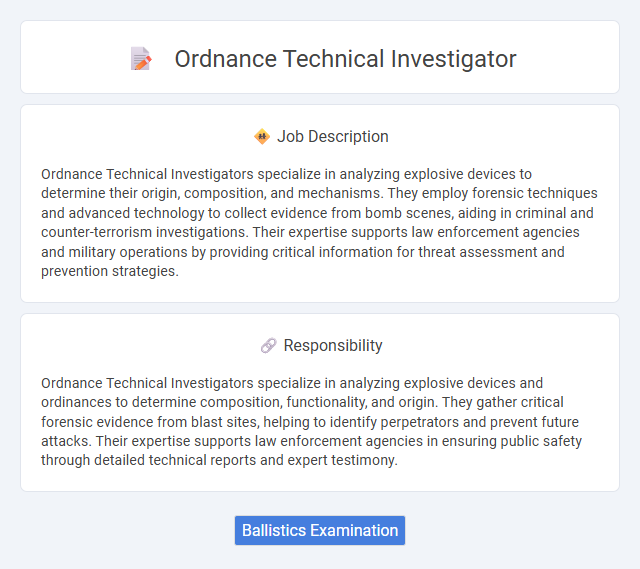
Ordnance Technical Investigators specialize in analyzing explosive devices to determine their origin, composition, and mechanisms. They employ forensic techniques and advanced technology to collect evidence from bomb scenes, aiding in criminal and counter-terrorism investigations. Their expertise supports law enforcement agencies and military operations by providing critical information for threat assessment and prevention strategies.
Individuals with strong analytical skills and attention to detail are likely to be well-suited for the role of an Ordnance Technical Investigator, as the job demands meticulous examination of explosive devices and technical evidence. Candidates who demonstrate resilience under pressure and maintain a high level of physical and mental fitness may have a higher probability of succeeding in this field. Those with an interest in forensic science and safety protocols could find the role aligns well with their capabilities and career goals.
Qualification
Ordnance Technical Investigators typically require a background in engineering, explosives, or forensic science, often holding a degree in mechanical engineering, chemistry, or a related technical field. Specialized training in explosive ordnance disposal (EOD) and forensic analysis is essential, along with certifications such as Certified Explosives Specialist (CES) or military EOD qualification. Strong analytical skills, experience with ordnance detection technologies, and knowledge of safety protocols are critical to effectively examining, identifying, and analyzing explosive devices.
Responsibility
Ordnance Technical Investigators specialize in analyzing explosive devices and ordinances to determine composition, functionality, and origin. They gather critical forensic evidence from blast sites, helping to identify perpetrators and prevent future attacks. Their expertise supports law enforcement agencies in ensuring public safety through detailed technical reports and expert testimony.
Benefit
Working as an Ordnance Technical Investigator likely offers the benefit of contributing to public safety by analyzing and identifying explosive devices, which can enhance community protection. The role may provide unique opportunities for specialized training and skill development in bomb disposal technologies and forensic investigation. Employment in this field could also come with competitive compensation and job stability, especially within governmental or defense sectors.
Challenge
Ordnance Technical Investigators likely face the challenge of analyzing complex explosive devices with limited time, requiring precise technical knowledge and attention to detail. The probability of encountering evolving threats means they must continuously update their skills and adapt to new technology. Balancing safety concerns with investigative objectives probably demands both mental resilience and strategic problem-solving.
Career Advancement
Ordnance Technical Investigators specialize in examining explosives, munitions, and related devices to determine causes of incidents and ensure safety compliance. Career advancement in this field often involves progressing to senior investigator roles, leading complex forensic analyses, and managing investigative teams within military or civilian agencies. Obtaining specialized certifications and advanced training in explosive ordnance disposal (EOD) and forensic science enhances promotion opportunities and access to strategic positions.
Key Terms
Ballistics Examination
An Ordnance Technical Investigator specializing in Ballistics Examination analyzes firearms, ammunition, and projectile trajectories to determine weapon types, firing distances, and impact points. This role involves detailed examination of bullet striations, cartridge cases, and gunshot residue to link evidence to specific firearms in criminal investigations. Experts utilize advanced ballistic imaging systems and databases like NIBIN to support forensic casework and legal proceedings.
 kuljobs.com
kuljobs.com